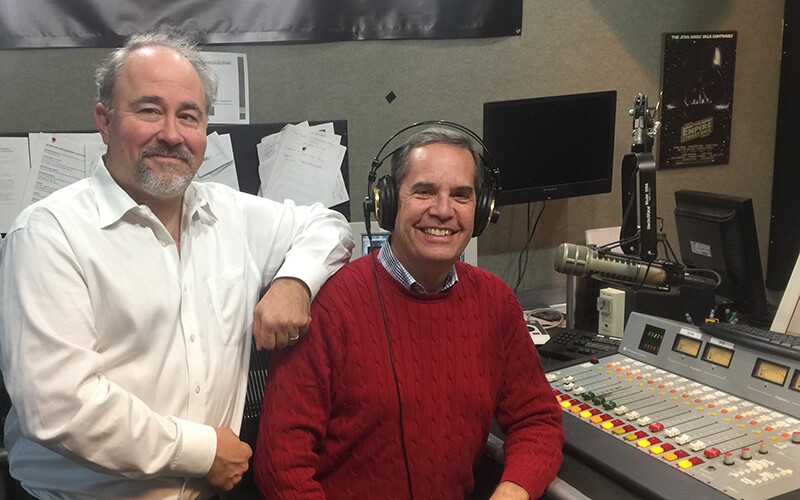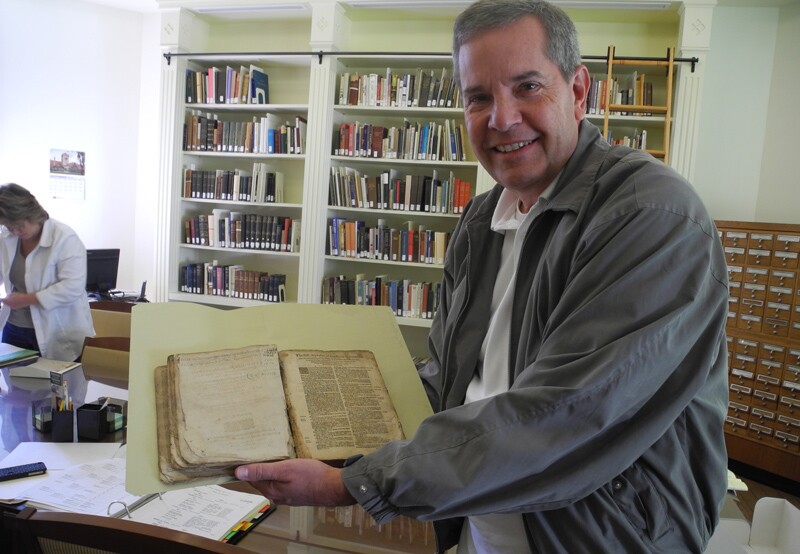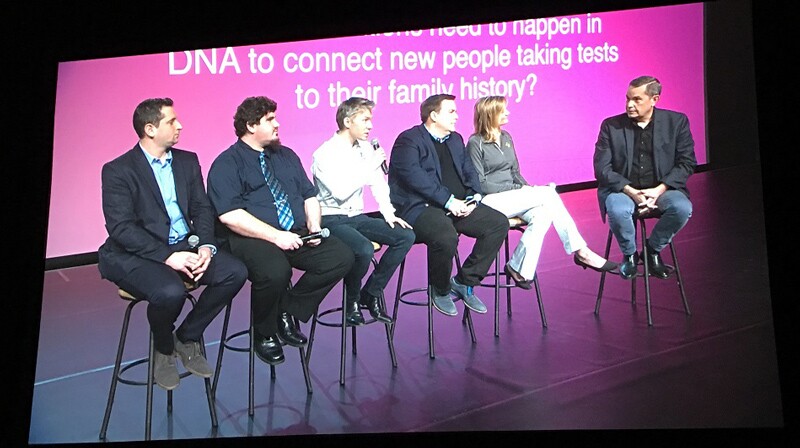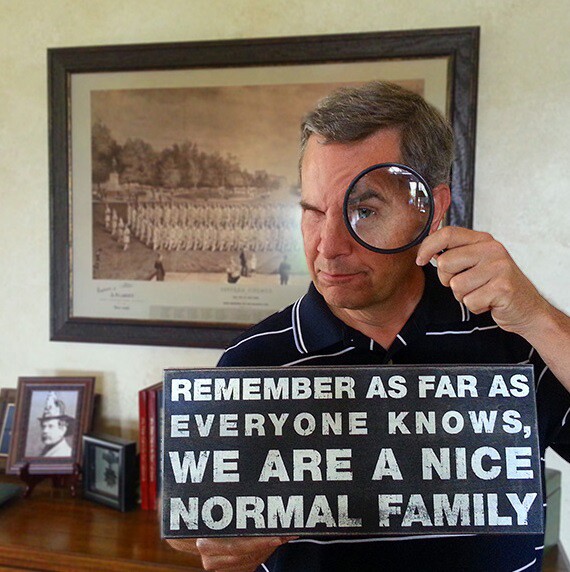If you should run into Scott Fisher and hear him tell folks that he is more comfortable with the dead than with the living, don’t be concerned that you’ve come across something worse than macabre. Just take a quick look at his résumé, and you’ll discover that “Fisher” has for decades mixed two loves—broadcasting and genealogy—into a fascinating meld of the here and hereafter.
Who Is Scott Fisher?
Scott Fisher is the host of Extreme Genes, a nationally syndicated radio show and podcast with hundreds of thousands of followers. He’s produced some 400 episodes to date.
A regular guest host is David Allen Lambert, chief genealogist for the New England Historic Genealogical Society (NEHGS). The NEHGS is the oldest of the many genealogical organizations in the United States. Fisher and Lambert provide news from the family history world and take questions from their audience, including such inanities as what one should do with rocks collected from a cemetery. “You can ask us anything!” Fisher says.

On radio, the show is heard in dozens of markets, including Boston, Washington D.C., Atlanta, Dallas, and Salt Lake City. What most people look forward to are Fisher's interviews with people from all over the world. The one requirement: have a great family history story or a tip on how to find one.
Before he became so deeply involved with genealogy, Fisher had another occupation. He was the “Fisher” of “Fisher and Todd,” a popular radio show that ran in Salt Lake City, Utah, for 15 years—from 1986 to 2001.
Those 15 years as hosts playing off each other and entertaining listeners between pop music sets may have set a record, according to Lynn Arave, Deseret News radio reporter who wrote during that era. Fisher and Todd outlasted 4 locations, 3 owners, 4 general managers, and 6 program directors in their marathon hitch. Fisher continued doing morning radio on several other stations through 2021, and then a midday slot through 2020, before calling it a career.
“I just got tired of the 4:30 a.m. wake up hours,” said Fisher. “It’s hard on the mind and body.”
Combining Fisher’s Passions for Genealogy and Radio
During his time spent in various radio ventures, Fisher was honing genealogical skills as well. “I drove past the FamilySearch Family History Library every day and began stopping in and gathering information on my ancestors,” he says. He has since compiled books on the various branches of his family tree, prominently displayed in a single bookcase in his home—14 of them to date.
“I have loved the journey,” he says.

The advent of DNA testing has had a significant effect on the ongoing search for ancestors, Fisher notes, greatly expanding the potential for finding family links.
He decided to combine his passions for radio and genealogy to become the creator and host of Extreme Genes and has loved learning from the experiences and stories of others.
“The stories just keep on coming. I’m fascinated by ordinary people with extraordinary finds,” he said in a telephone interview from his home in Washington, Utah.
For instance, in episode 382, Fisher’s guest Jennifer Mendelsohn took viewers through a fascinating recounting of her efforts to find Jewish Americans whose kin were affected by the World War II Holocaust.
Many survivors, Mendelsohn said, were affected by the “myth” that attempts to find their kin were useless. In her own case, she learned the truth about her family's situation. In a search of the 1940 U.S. census, she said, “I fell accidentally down a rabbit hole.” Her research has since resulted in the reconnection of many Jewish families. She started with her own mother, asking if there had not been a “lot of buzz” about emigration from Europe as desperate Jewish families tried to flee. There had been, her mother told her, but finding out who died, who actually left, and where they went was a challenge.
Mendelsohn learned that one of the immigrants in her family was a single woman who traveled under her maiden name. Coupled with the fact that immigrants had to disclose the names of those who sponsored their entry to the United States, the search began to yield rewards, she says. She was eventually able to tell her mother that she had 3 cousins still living. Old age made it impossible for the cousins to meet, but letters, gift exchanges, and Skype reunion visits overflowed with reminiscence.

Helping Others Find Their Families
Besides searching out fascinating stories among the world’s genealogists, Fisher can tell some of his own. There was, for instance, his search for a photo of a great-grandfather who served on a volunteer fire brigade in New York City in the mid-19th century. Fisher plumbed every source he could think of in New York in hopes of finding a picture of this ancestor, but each attempt resulted in a dead end. Then, in 2010, he learned that his ancestor's Veteran Firemen's Association has come through Salt Lake City in 1887 on a train trip to San Francisco. On this occasion, they paraded with local firemen who hosted them, as they did in other cities along the way. Fisher found out that Salt Lake’s This Is the Place State Park included a recreation of the old Salt Lake Firemen's Hall, which displayed all of their antique memorabilia. He browsed the exhibits there and found a large photo of the New York volunteer firefighter contingent, which included a photo key, naming each man in the picture, including Fisher's long sought-after New York ancestor.
“I couldn't believe it!” he says. “Who could have imaged I would have found this picture on a wall in the Salt Lake City area? Where I then lived!”
Fisher’s lifetime accumulation of experience got a real workout when he volunteered to try to help police find relatives of a murder victim whose remains had been found in Utah after more than 30 years. His efforts received national attention, including an article in People magazine, which ran in April of 2015.

Police investigators gave Fisher few facts he could use to connect Theresa Rose Greaves, 23, to anyone. She had come to Utah in hopes of finding a job (and seeing Donny Osmond in person, according to friends). She went missing on 5 August 1983. Her body evidently had lain on a hillside in the Fruit Heights area of Utah’s Davis County for more than 30 years before a jogger discovered her skull on 5 February 2015. After identification, extensive police attmepts to learn more about the case and locate family went nowhere.
To find her next of kin, Fisher did what really good genealogists do. He began with the meager information that was available: Theresa had been wearing a class ring from Collingswood High School in her hometown in New Jersey. He then located a Facebook page for the Collingswood High Class of '77.
A former classmate had been friends with Theresa and, at Fisher's request, canvassed some of the homes in Theresa’s old neighborhood seeking information. She found a woman who remembered the Greaves' family, including 2 uncles and the grandmother who had raised Theresa. Fisher soon learned that all have since passed.
Then, after some forty hours of research, Fisher connected with one of Theresa's cousins, and then a half-brother. As a result, Theresa's remains have since been buried with those of her grandmother in Newport News, Virginia, giving peace and closure to the many family members and friends who mourned her loss.
This was an unusual application of Fisher’s highly honed genealogical skills, but maybe not the last. Who knows when there is a new and fascinating family history tale to tell? Fisher and his team are likely to be telling it on an upcoming edition of Extreme Genes.
The Origin of Extreme Genes
Oh, yes. About the origin of the name Extreme Genes: His mother—explaining to a young Scott about his roots—told him that with a mother from Oregon and a father from New Jersey, there were bound to be “extreme genes.” Fisher has learned that his own family—and thousands more—do, in fact, have extreme genes, which keeps Fisher on the microphone, eagerly interviewing his next interesting guest or guests and helping to tell their story.

